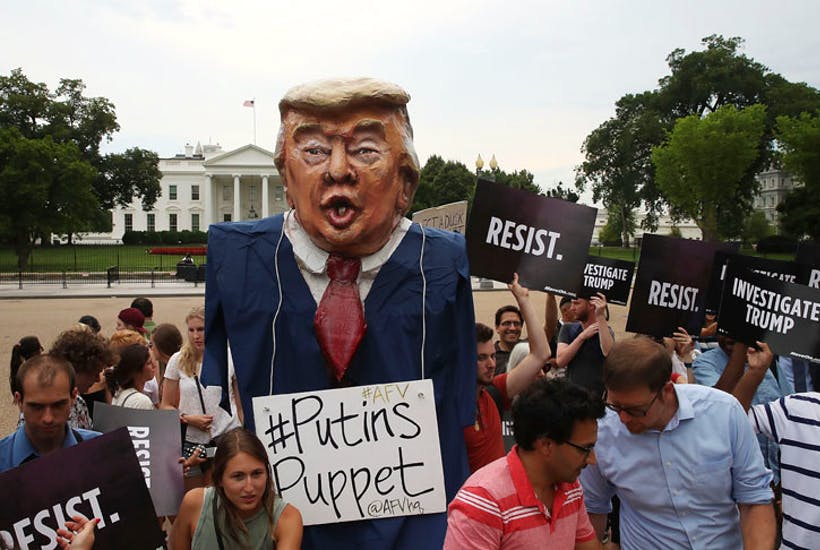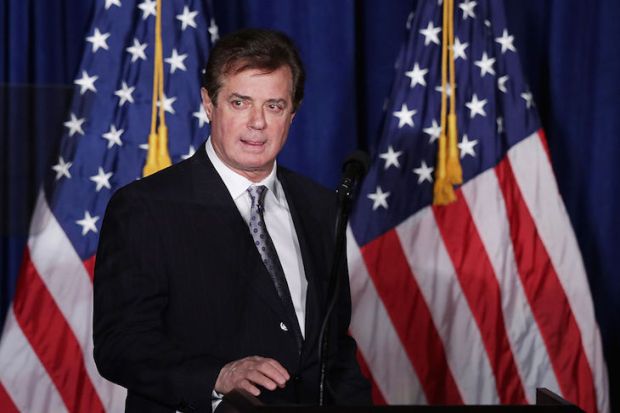Washington D.C.
Political scandals sometimes throw up deliciously eccentric minor characters. Trump-Russia — a scandal or merely a crisis, according to taste — now has one: Rob Goldstone. He is described as a British former tabloid journalist, a music promoter, former Miss Universe pageant judge, and friend of the Trumps. Facebook videos reveal a short, tubby man with a northern accent and voice that seems a couple of octaves too high for his bulk. Twitter photos show him in a black shirt with a shiny gold tie; or holding velvet loafers up to his double chin, the word ‘Sex!’ embroidered on the toecaps; or wearing a gold baseball hat bearing the legend ‘CUNTY’. (Urban Dictionary: ‘Cunty, adj, conceited, cocky, acting like a bitch on the rag.’) In other words, he is a cheerful vulgarian of a type at home in Trumpworld.
Goldstone is now cast as the unlikely cut-out between the Kremlin and the Trump campaign during the presidential election. One of his clients is an Azeri pop singer named Emin Agalarov, whose father, Aras, is a minor oligarch in Russia and a reputed ally of Vladimir Putin. Goldstone wrote to Donald Trump Jr — the president’s eldest son — in June last year. ‘Emin just called and asked me to contact you with something very interesting,’ he said. ‘The Crown prosecutor of Russia met with his father Aras this morning and… offered to provide the Trump campaign with information that would incriminate Hillary… and would be very useful to your father. This is obviously high-level and sensitive information but is part of Russia and its government’s support for Mr Trump.’ Don Jr replied: ‘If it’s what you say, I love it.’ A meeting with a Russian lawyer, Natalia Veselnitskaya, followed.
To state the obvious: this is very bad for the President, his worst day yet in the Russia scandal/crisis. Donald Trump (senior) has always refused to agree with the assessment of the US intelligence agencies that Russia interfered in the election and did so to put him in the Oval Office. One of his aides told me that there was no evidence for this — it was a political statement engineered by Trump’s enemies at the top of the intelligence agencies. The White House will find it difficult to stick to that line now the President’s son has admitted going to a meeting he believed was arranged on the basis of Russian government support for his father’s campaign. The emails undo months of denials — no matter how much the President tweets that his son is innocent.
Still, the Pavlovian reaction of much of the US media to any development in the Trump-Russia story, a veritable orgiastic frenzy of delight, may be misjudged this time. The main way in which the Russians are alleged to have subverted the US election was by hacking the emails of Democratic party politicians and giving them to WikiLeaks. A former senior Obama administration official, briefed at the time by the intelligence agencies, told me Trump’s people told the Russians who to hack and when to publish to do the most damage. This is the alleged collusion being investigated by Congressional committees, a special counsel, and the FBI. By his own account, Junior’s meeting had nothing to do with any such conspiracy (for which no evidence has yet emerged). He says he was not being offered hacked material, criminally obtained, but official Russian legal documents.
True, Jr hasn’t helped himself by changing his story. First, he said the emails were about meeting a lawyer from Moscow to discuss helping Russian orphans. Then, when the New York Times acquired the emails, he admitted the meeting’s true purpose (getting dirt on Hillary). His defence now seems to be that he didn’t succeed in getting anything useful. The conservative commentator Charles Krauthammer, loyal to the President on this issue in the past, told Fox News: ‘It’s a hell of a defence to say that your collusion wasn’t competent and that it didn’t work out.’ One US TV anchor said: ‘If there was no collusion, Donald Trump Jr was certainly collusion-curious.’
White House surrogates trotted out a wearily familiar argument: it was naivety; these are not professional politicians. This defence was used when the President’s son-in-law, Jared Kushner, forgot to mention a meeting with the Russian ambassador and when the President himself appeared to ask the then FBI director to drop the Russia investigation. ‘The President’s new at this,’ said the House Speaker, Paul Ryan, at the time. ‘He is learning as he goes.’ This may not work for Don Jr. The emails appear to show a clear intent to get Kremlin help. The law governing presidential campaigns forbids taking anything of value from foreign governments. The jails are full of people for whom ignorance of the law was no defence. Jr’s lawyers may have to argue that derogatory information did not constitute material help.
Perhaps Rob Goldstone simply got it wrong when he spoke about Russian government support for Trump. But he apparently spends a great deal of time in Moscow and in the past he’s been wonderfully forthright. An interview has surfaced that he gave to the Sydney Morning Herald in 1984 after visiting Ethiopia for Band Aid, the pop world’s fundraising for famine victims. While there, he managed to put on seven pounds. ‘We were staying at the Hilton,’ the paper quotes him as saying. ‘Once you do your bit, what else is there to do in a country like Ethiopia but eat?’
In fact, the Goldstone emails and Trump Jr’s meeting are evidence that the campaign did not have a secret pipeline to the Kremlin, at least not back in June of 2016. If it did, why would such a fumbling attempt to get dirt have been needed? I’ve spoken to three separate US intelligence sources who have seen the top-secret intercepts of Trump’s people communicating with the Russians. These sources say there is no single conversation that proves a conspiracy, no smoking gun, in the language of Watergate. But there are a worrying number of contacts.
So important questions remain: Was Jr’s meeting with the Russian lawyer the only such encounter with someone believed to represent the Kremlin? If there were more, was information, or other help, ever accepted? Did the President have prior knowledge of this meeting, or of any others? These emails were presumably given to the New York Times by someone in the intelligence community. It seems unlikely this will be the last such leak— there may be yet more ‘worst days’ to come for Trump on Russia.
Listen to Paul Wood and Freddy Gray on the Spectator Podcast:
Paul Wood is a BBC correspondent in Washington and a fellow of the New America foundation.
Got something to add? Join the discussion and comment below.
Get 10 issues for just $10
Subscribe to The Spectator Australia today for the next 10 magazine issues, plus full online access, for just $10.
You might disagree with half of it, but you’ll enjoy reading all of it. Try your first month for free, then just $2 a week for the remainder of your first year.














Comments
Don't miss out
Join the conversation with other Spectator Australia readers. Subscribe to leave a comment.
SUBSCRIBEAlready a subscriber? Log in